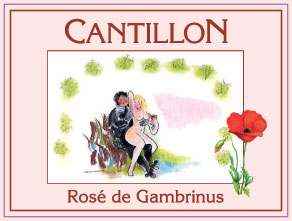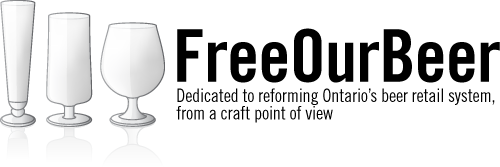 This will be a new feature at FreeOurBeer.org: Unavailable Beer of the Month. This column will feature different beers from around the world that are unavailable for sale in Ontario, but might possibly be available under a private retail system if we had one.
This will be a new feature at FreeOurBeer.org: Unavailable Beer of the Month. This column will feature different beers from around the world that are unavailable for sale in Ontario, but might possibly be available under a private retail system if we had one.
Today I’m tasting a beer from one of the most famous breweries in the world – Cantillon. Cantillon, located in Brussels, Belgium is renowned for their traditional lambic beers. Lambics are truly a unique style and certainly one of my favourites.
The beer I’m trying is Rose de Gambrinus, a lambic flavoured with raspberries. Unlike most of the lambic versions that the LCBO releases (such as Chapeau Kriek which is part of the current summer release), Cantillon’s are much more “traditional” in style – very sour and tart rather than sweet and ‘poppy’. To some it can be an acquired taste! The beer pours with only a slight amount of carbonation and no head. It’s got a rich fruit flavour and an intense sourness upon sipping. I love sour fruit and especially sour beers, and this one is one of my favourites.
This particular bottle I acquired during the famous Cantillon private order from 2003/2004. What made this order famous is that the Cantillon Kriek was rejected for sale in Ontario due to the presence of a chemical which is acceptable in wine but not in beer. The challenges that Cantillon were faced with has led to there not being any more private orders offered to the public since. To my knowledge Cantillon has never been available for retail sale in Ontario. One can, however, have Cantillon at beerbistro, who secured a private order for themselves recently. Cantillon is regularly available for retail sale in the U.S., and can be found at Premier Gourmet in Buffalo.
Rose de Gambrinus is representative of one of the most unique styles of beer in the world. Under a private retail system which favours beer aficionados, this one would undoubtedly be a big hit. Alas, as things stand right now, it is unavailable to buy and enjoy at home.



6 responses so far ↓
1 Lager Bore // Jul 18, 2008 at 2:23 pm
When I visited Cantillon in ’04 I didn’t know anything about the infamous private order. I asked the brewer’s daughter, who appeared to run the paperwork side of things, if any effort was being made to ship Cantillon to Ontario. She replied that there was basically too much red tape involved.
Alas we must make do with red-eye trips to Buffalo and, with all due respect to the fine folks at beerbistro, hefty premiums.
What, I wonder, was the chemical in Cantillon?
2 The Punished // Jul 18, 2008 at 3:41 pm
I believe the chemical that the LCBO was so concerned about was “Potassium FerroCyanide”. This is found in the pits of a lot of fruit. In this case it was the cherry pits that caused trace amounts to come up in the final product. Obviously someone was trying to be a hero when they saw the term “cyanide”. For people who are in charge of controlling absolutely all incoming alcohol to our beautiful province, they are definitely lacking education when it comes to beer.
3 Magni // Jul 24, 2008 at 4:18 pm
This is an interesting comment about Potassium FerroCyanide, and it is no surpise that it did not pass the bill when it was examined albeit it being allowed in wine. I ocassionally use P. Ferrocyanide in my professional practise as a photographer and it is without doubt that it is a most serious chemical. Education or not, sometimes it’s hard to make the right decision.
However, people have been drinking this style of beer for hundreds of years and it is widly available in both Europe and the United States, the ‘Hero” comment is well deserved.
It’s a shame, but if perhaps it was too unfit for Ontario consumption, they should’ve stopped me coming back last summer with a suitcase full of the stuff.
4 Derek // Sep 17, 2008 at 7:07 pm
Once many summers ago, the LCBO had Dupont Saison available, but for the past few summers – no more. It is truly sad it is a great beer. I’ve also noticed that the “summer beers” don’t get to Kingston (if they ever do) until September. Thanks LCBO! Summer is over! Maybe it is their way of saying that some of the beers don’t sell.
5 Beer Importing - The Order Paperwork | Free Our Beer // May 10, 2009 at 8:44 am
[…] will know that the LCBO tests products that they sell. A good idea in theory, but has led to some unfortunate cases. What is also unfortunate is that the LCBO charges for testing, and that charge is passed along […]
6 Casey // Mar 16, 2010 at 10:42 am
I know little about wine or beer making and not much about chemistry either, however, I have an interest in what sorts of additives go into food, cosmetics, etc. and their effects on our health and the environment. So I know that in the comment by “The Punished” (above) there is some erroneous information.
Cherry pits (and pits of any fruits) do not contain potassium ferrocyanide.They don’t even contain “cyanide” per se. Rather, they contain cyanogenic glycosides that can release hydrogen cyanide when chewed or ingested.
Potassium ferrocyanide is not made from fruit pits and this chemical is not found in fruit pits. I forget exactly how it is made but it’s something like this: throw a bunch of iron filings on coal and heat it red hot then throw in some potassium hydroxide. That’s probably not right but if you care then look it up. I am quite sure it is not made from fruit though.
Potassium ferrocyanide is *added* to wines as a fining agent (blue fining) to remove small particles of copper and iron left behind by the wine-making equipment. The potassium ferrocyanide in the wine is not really any serious concern. You would have to drink so much wine that you would die of acute alcohol poisoning well before you could get enough cyanide in you to cause any harm.
This chemical is not all that dangerous either. It is listed as “hazardous” but it has a health rating of only “1” (slight), reactivity “1”, and a contact rating of “2” (moderate). You wouldn’t want to have a bucket of it and accidentally pour acid on it though – and that’s exactly why some countries have strict regulations on it. Concerns about accidents at wine-making facilities and the possibilities of it being more readily available for use by terrorists seem to be at the forefront of those worries.
As usual, the regulations on potassium ferrocyanide for the wine-making industry are at least a little ridiculous. Most computer printer ink cartridges have plenty of this chemical in them just to give one example. It is not exactly difficult to get your hands on the stuff (suggestion: wear gloves) ~lol~.
As for cyanogenic glycosides from fruit pits, it would be impossible to consume enough wine for this to be harmful. Alcohol is also listed as a poison ya know ;’)